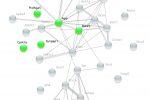Dementia describes the serious loss of neurons causing diminishing cognitive functions such as remembering, producing and understanding language, solving problems, and making decisions. The most common cause of dementia is Alzheimer’s disease. As scientists from the John Hopkins University in Baltimore (USA) have estimated, there were 26.6 million cases of Alzheimer’s disease worldwide in 2006. By 2050, they expect this number to quadruple. 1 in 85 persons will then be affected and in need of care, making Alzheimer’s one of the most costly diseases for society.
However, no preventive or curative therapy is available today. The few drugs that have been approved by regulatory agencies offer only a small symptomatic benefit. “Alzheimer’s is a multi-factorial disease. This calls for a change in the therapeutic paradigm towards a multitarget approach”, says Dr. Bernd Seilheimer, Head of Bioregulatory Development at Biologische Heilmittel Heel GmbH in Baden-Baden (Germany).
Alzheimer calls for multitarget medication
The benefit of a multitarget approach has now been demonstrated in preclinical studies. Hereby a medication was tested that is based on a combination of several natural substances in low doses. Initial studies using the electroencephalogram (EEG) as an approved standard method in medical diagnostics indicated strong effects on cognitive functions.
The gene clusters (in vivo) affected by the medication were identified at the St. Laurent Institute in Cambridge, MA (USA) using “Next Generation” genomics on the Helicos Genetic Analysis Platform. Based on these results, the effect on the processing of amyloid precursor protein (sAPPα and sAPPβ), as well as neuronal growth and synaptic levels was determined at the University Hospital of Ulm (Germany) using molecular biological techniques.
„We are fascinated by the results“, says Dr. Bernd Seilheimer from Heel. “This homeopathically prepared medication leads to significant changes in the gene networks associated with synaptic function and plasticity. It significantly reduces the gene expression of APP and BACE, responsible for the formation of β-amyloid plaques which hallmark Alzheimer’s disease. Upon treatment, axons of neurons even grew faster and longer than under saline control conditions.”
Studies in-vitro and in-vivo verify efficacy
Independently from each other, additional murine in-vivo tests were conducted at two contract research organizations in France and in Finland. Through scopolamine pre-treatment, cognitive functions were attenuated. Administration of different dosages of the preparation in comparison to the “Gold Standard” donepezil revealed that the abilities to orient, to sensitively recognize objects and to remember improved. This could be observed in several behavioral tests.
„All studies have confirmed our earlier observations: this medication has proven to enhance the learning and memory performance significantly in a dose-dependent fashion”, says Dr. Bernd Seilheimer from Heel. “It showed at least as effective as the Gold Standard at all tested behavioral models. In addition, it is very well-tolerated. No negative side-effects could be documented with the natural preparation. Following the new paradigm, multitarget preparations could become a natural alternative to conventional preparations for treating complex diseases such as Alzheimer’s.”




